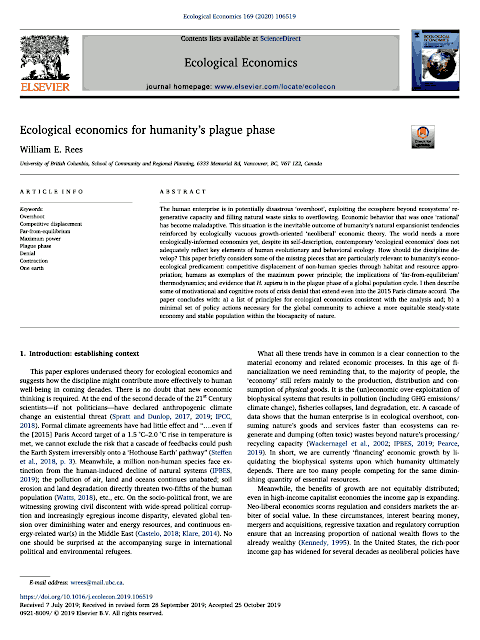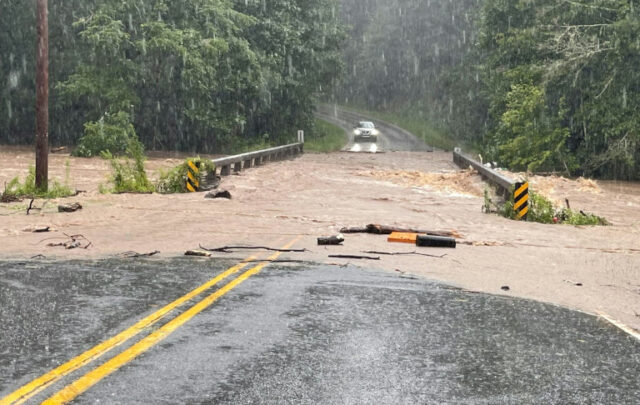Each morning the Sun comes up. We instinctively know this. The problem is that in the modern world, people sometimes find it difficult to tell the difference between: Natural phenomena – like the Sun rising; and the grandiose myths we tell ourselves – like the functioning of the economy.
In this series I don’t want to just look at big heavy books. I also want to review significant papers from academic journals. I’ve picked this paper as an example of an academic work that needs to be more widely read. Written by Professor William E. Rees, one of the originators of the idea of ‘ecological footprinting’, it reviews how humanity is changing the global environment.

Ecological Economics:
‘Ecological Economics For Humanity’s Plague Phase’, vol.169 art.106519, March 2020 (pay-walled).‘open copy’ of paper here
If you click the link to this paper you’re immediately confronted by a pay-wall, and asked for $40. Don’t despair. Go to Google Scholar, or if your service provider doesn’t block it, Sci-Hub, and you can often access a copy of the paper for free.
When people look at an academic paper they tend to read the abstract – and perhaps not much else. That’s a pity as the abstract rarely captures the important detail, and certainly not the key statements in a paper which give it value.
Well written ‘review articles’ such as this are a really good way for the public to understand an issue. It lists the key facts, but more importantly, it references all the best research on an issue; that ideally you’d take the time to look-up and read as well.
Let’s begin with the abstract:
The human enterprise is in potentially disastrous ‘overshoot’, exploiting the ecosphere beyond ecosystems’ regenerative capacity and filling natural waste sinks to overflowing. Economic behaviour that was once ‘rational’ has become maladaptive. This situation is the inevitable outcome of humanity’s natural expansionist tendencies reinforced by ecologically vacuous growth-oriented ‘neoliberal’ economic theory.
What this paper is exploring is why humanity, but more importantly the people who really should know better – the economists – can’t see the effects that we’re having on the planet. Or more formally, why they might see them, but they disregard them because they don’t give them adequate weight compared to other factors.
Ecological economics has technically always been part of economics – right back to Adam Smith and William Stanley Jevons. It didn’t really become ‘a thing’ in its own right until the 1970s, when mainstream economics was politicised, and diverge from observed reality to became the secular religion of growth and affluence.
That’s also when ecological economics became controversial, because it departed from that politicised message of progress and consumption.
As Rees says on page 2:
The economic paradigms that run our lives are made-up stories, complex social constructs conceived in language and massaged into accepted theory through academic debate, social discourse and practical experience. However, just because some economic model has become received wisdom does not mean it accurately represents either actual human behaviour or that of the ecological systems with which the economy interacts in the real world.
Quite simply, economists don’t see the impact of their system because that issue doesn’t have value in the stories they tell.
The issue here are the mathematics of exponential growth. This is what politicians and the media idolise, and we pay homage to in the financial bulletins of news broadcasts. The fact is, though, it’s the material implications of human growth which – virus like – are killing the Earth as we consume it.
There’s a very eye-catching graph of that on page 4. The best explanation of that is in the text to the left:
…it is these parallel (and on-going) increases in energy supply, population, resource consumption and waste production that are driving climate change and the precipitous degradation of the ecosphere… It is a quirk of exponential growth that half the fossil energy ever used has been burned in just the past 35 years! (The same for many other industrially important minerals and metals and waste generation and pollution.)
The conclusion, on page 7, states the clear need for change:
De facto human eco-behavior should become the foundation for eco-economic policy in the 21st Century. It is clear for the reasons explored above that the human enterprise already exceeds global carrying capacity and is dangerously into overshoot – 68 % in 2016.
The greater truth that the paper encapsulates, though, is stated on page 8:
No doubt the political and economic mainstream – and many ordinary citizens – will see these principles and actions as impossibly radical. Again, however, they are consistent with basic theory and empirical evidence. On its current trajectory, the present system will crash; the corrective throughput reductions suggested above are in line with those of various other technical analyses.
Over recent years, as more papers like this have circulated in prestigious academic journals, I’ve tried to discuss their contents with the section of the public who should be most concerned – environmentalists. The fact is, though, many environmentalist also consider papers such as this to be ‘impossibly radical’.
Just as Rees outlines in relation to ecological economics, if environmentalism has failed to have any impact upon environmental destruction, it is because those involved have compromised on the issue of growth, and consumerism, despite all evidence to the contrary. They abandoned the truly radical nature of early environmentalism, to become ineffectual ‘green consumers’.
Necessarily provocative review papers, such as this, are intended to provoke debate. The problem is they are all too often silenced – ignored by the media, as well as the people who profess to represent the ideas they contain.
William Rees’ paper deserves a far wider readership and debate. And it is only by reading academic papers such as this, that the public can circumvent that ideological block in the mainstream media, as well as overly conservative lobby groups, and discuss that the knowledge they contain – hopefully, to shift those intransigent blocks to change.
Teaser photo credit: By Georges Seguin (Okki) – Own work, CC BY-SA 4.0, https://commons.wikimedia.org/w/index.php?curid=75873370





